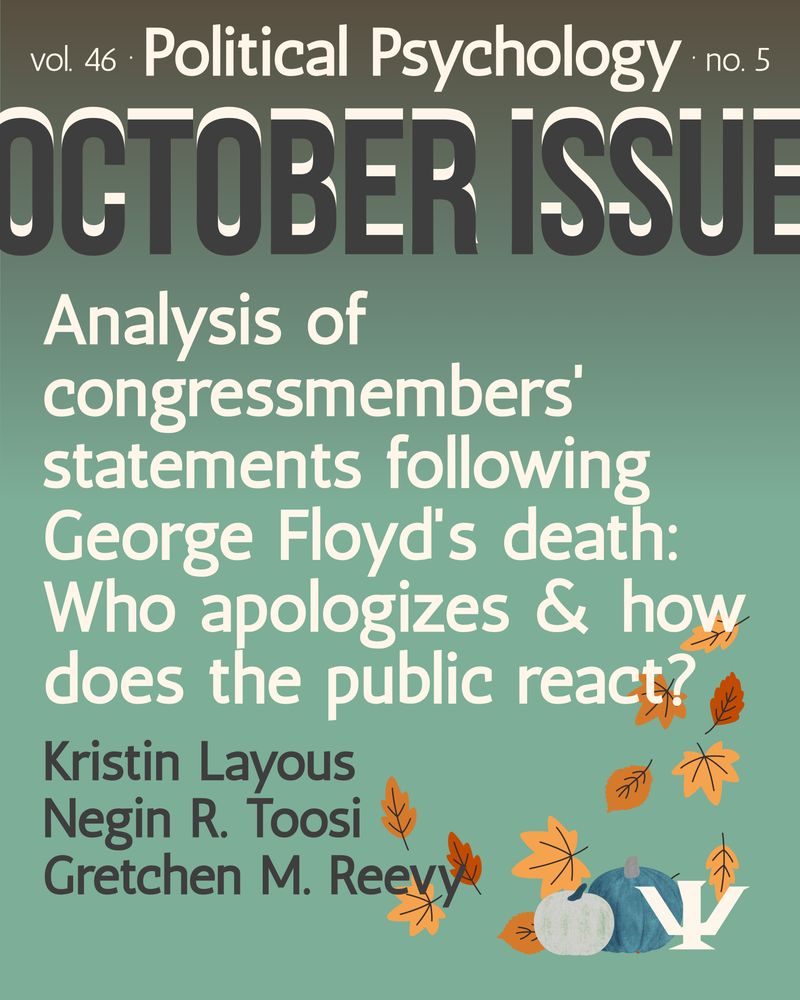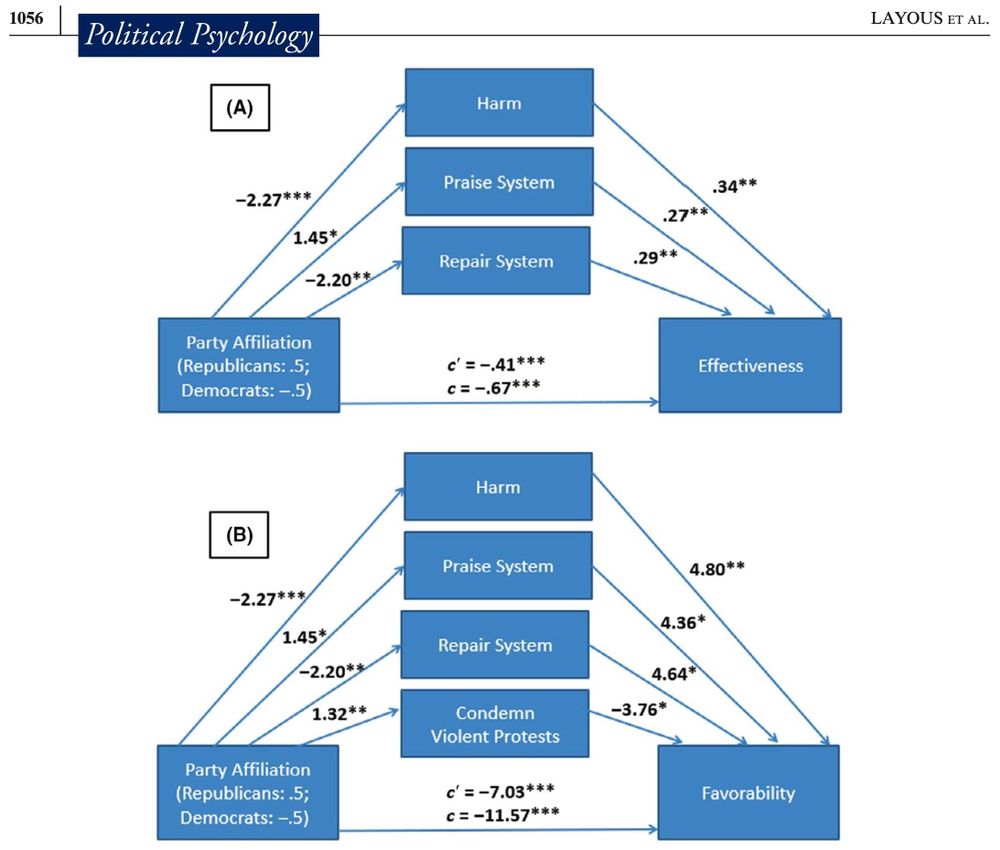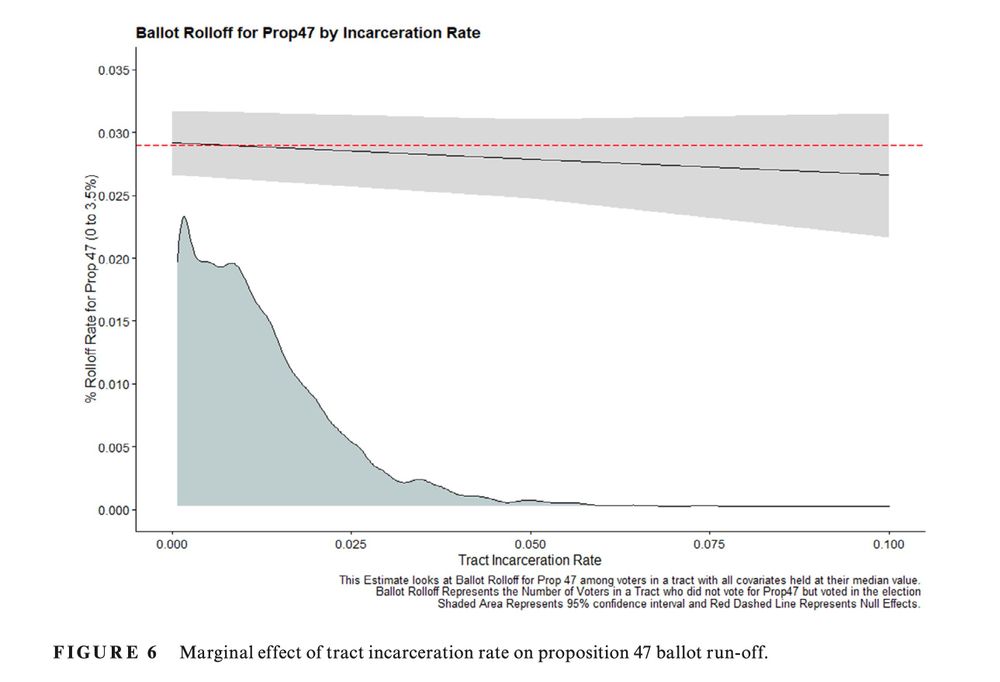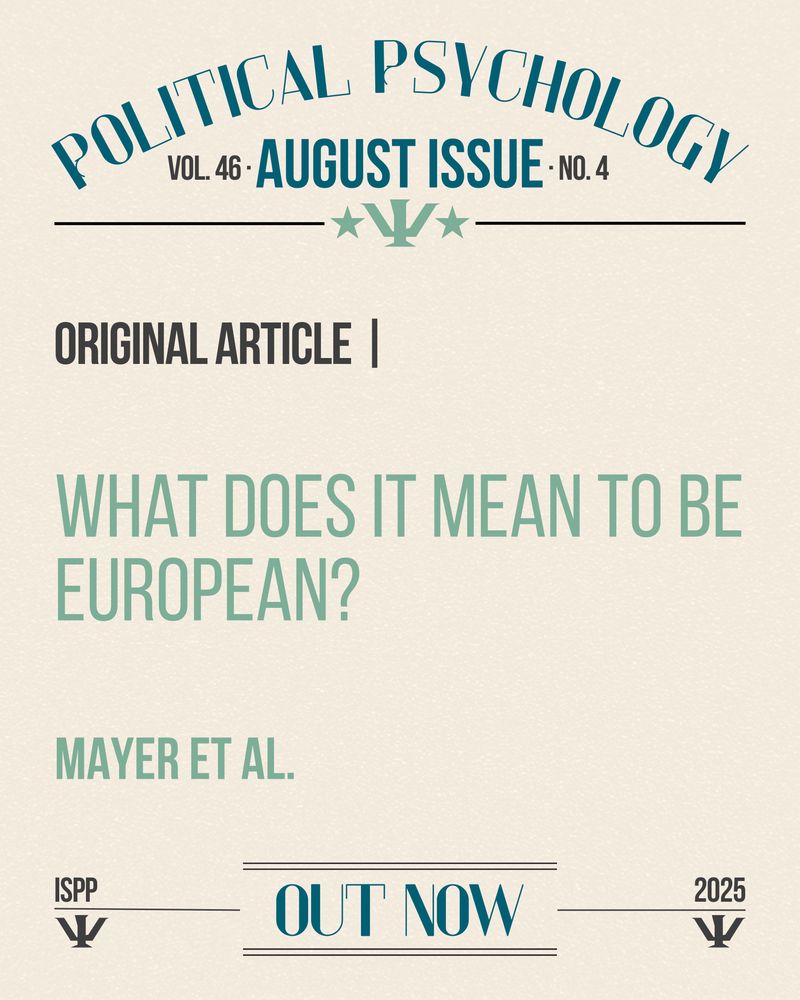
Political Psychology
@ispp-pops.bsky.social
Political Psychology is a peer-reviewed academic journal published by ISPP (@polpsyispp.bsky.social)
co-EiC: @lizsuhay.bsky.social & @mjbsp.bsky.social
Follow us everywhere & current issue: linktr.ee/POPSjournal
co-EiC: @lizsuhay.bsky.social & @mjbsp.bsky.social
Follow us everywhere & current issue: linktr.ee/POPSjournal
When does "they" go from pronoun to Pronoun? In our October issue, Renström & Klysing study ideological ties to use/views of gender-inclusive language. Read their findings on how Social Dominance Orientation & Right Wing Authoritarianism relate to de-gendered & multi-gendered "they." buff.ly/durLXMS


November 6, 2025 at 5:25 PM
When does "they" go from pronoun to Pronoun? In our October issue, Renström & Klysing study ideological ties to use/views of gender-inclusive language. Read their findings on how Social Dominance Orientation & Right Wing Authoritarianism relate to de-gendered & multi-gendered "they." buff.ly/durLXMS
Reposted by Political Psychology
🧬Check out this recent article, “Extraversion Probably Does Not Cause Political Participation. Evidence from Two Genetically Informed Designs,” published in @ispp-pops.bsky.social by Rafael Ahlskog👇
doi.org/10.1111/pops... #polisky
doi.org/10.1111/pops... #polisky

Extraversion Probably Does Not Cause Political Participation. Evidence from Two Genetically Informed Designs
A substantial literature in political psychology has emphasized the importance of personality traits for understanding differences in political participation. One such trait is extraversion. However,...
doi.org
November 6, 2025 at 3:44 PM
🧬Check out this recent article, “Extraversion Probably Does Not Cause Political Participation. Evidence from Two Genetically Informed Designs,” published in @ispp-pops.bsky.social by Rafael Ahlskog👇
doi.org/10.1111/pops... #polisky
doi.org/10.1111/pops... #polisky
What do our leaders say after tragedy? Layous et al. study Congressmembers' official statements after George Floyd's death. They find sorrow shared equally by Republicans & Democrats, but trends of system "defending" & system "mending" statements from each, respectively. Read more: buff.ly/J0MVJBD


November 5, 2025 at 6:30 PM
What do our leaders say after tragedy? Layous et al. study Congressmembers' official statements after George Floyd's death. They find sorrow shared equally by Republicans & Democrats, but trends of system "defending" & system "mending" statements from each, respectively. Read more: buff.ly/J0MVJBD
Does the carceral state discourage or mobilize voters? Krishnamurthy's piece in our October issue on California's Proposition 47 finds that high incarceration rate communities were associated w/ increased voter turnout & higher support for the criminal justice reform measure. doi.org/10.1111/pops...




November 4, 2025 at 6:58 PM
Does the carceral state discourage or mobilize voters? Krishnamurthy's piece in our October issue on California's Proposition 47 finds that high incarceration rate communities were associated w/ increased voter turnout & higher support for the criminal justice reform measure. doi.org/10.1111/pops...
Who motivates future political engagement? Wegemer & Levy's panel study of high school students finds that political interest is mostly self-driven. For most students, motivation largely predicted more political discussions, rather than the other way around. Read online: doi.org/10.1111/pops...



October 31, 2025 at 3:26 PM
Who motivates future political engagement? Wegemer & Levy's panel study of high school students finds that political interest is mostly self-driven. For most students, motivation largely predicted more political discussions, rather than the other way around. Read online: doi.org/10.1111/pops...
Reposted by Political Psychology
How should scholars gather and analyze survey data from authoritarian countries? 🧵 (1/7)
October 28, 2025 at 3:12 PM
How should scholars gather and analyze survey data from authoritarian countries? 🧵 (1/7)
Reposted by Political Psychology
Our latest publication with @markberlin2.bsky.social is out in @ispp-pops.bsky.social.
We examine what happens when armed groups deny responsibility for violence and find that denials can erode trust in government and shape how people feel about violence.
Read more here: doi.org/10.1111/pops...
We examine what happens when armed groups deny responsibility for violence and find that denials can erode trust in government and shape how people feel about violence.
Read more here: doi.org/10.1111/pops...

October 28, 2025 at 4:08 PM
Our latest publication with @markberlin2.bsky.social is out in @ispp-pops.bsky.social.
We examine what happens when armed groups deny responsibility for violence and find that denials can erode trust in government and shape how people feel about violence.
Read more here: doi.org/10.1111/pops...
We examine what happens when armed groups deny responsibility for violence and find that denials can erode trust in government and shape how people feel about violence.
Read more here: doi.org/10.1111/pops...
What makes some people tolerate organized crime like the mafia? This article from Mirisola et al. in our October issue points to the interplay of national and territorial identity and masculine honor values as leading factors. Read the full article online for more: doi.org/10.1111/pops...



October 28, 2025 at 6:28 PM
What makes some people tolerate organized crime like the mafia? This article from Mirisola et al. in our October issue points to the interplay of national and territorial identity and masculine honor values as leading factors. Read the full article online for more: doi.org/10.1111/pops...
How does culture impact system justification in individuals? This article from Li & Tian exploring political belief finds that views prioritizing relationships & harmony are linked to a stronger tendency to justify the existing social & political system. Read online: buff.ly/yJQjeTY


October 21, 2025 at 1:54 PM
How does culture impact system justification in individuals? This article from Li & Tian exploring political belief finds that views prioritizing relationships & harmony are linked to a stronger tendency to justify the existing social & political system. Read online: buff.ly/yJQjeTY
Do we grow out of susceptibility to conspiracy beliefs? In our October issue, Bordeleau & Stockemer's analysis of existing research finds a negative correlation between age and conspiracy endorsement. Read the findings and what they could mean for future conspiracy research: doi.org/10.1111/pops...


October 16, 2025 at 6:05 PM
Do we grow out of susceptibility to conspiracy beliefs? In our October issue, Bordeleau & Stockemer's analysis of existing research finds a negative correlation between age and conspiracy endorsement. Read the findings and what they could mean for future conspiracy research: doi.org/10.1111/pops...
How do we decide if we can trust another group? Wei et al.'s article in our October issue shows that trust is a complex dynamic, not built on one trait alone. They find that warmth towards an outgroup only boosts trust when also seen as competent.
Read more online: doi.org/10.1111/pops...
Read more online: doi.org/10.1111/pops...



October 15, 2025 at 5:59 PM
How do we decide if we can trust another group? Wei et al.'s article in our October issue shows that trust is a complex dynamic, not built on one trait alone. They find that warmth towards an outgroup only boosts trust when also seen as competent.
Read more online: doi.org/10.1111/pops...
Read more online: doi.org/10.1111/pops...
Reposted by Political Psychology
🌐Check out this recent article, “Ethos of Conflict in the International Arena: Power Predicts Expression of Threat for Security and Hope for Peace in Speeches of Leaders of Nations in Conflict,” in @ispp-pops.bsky.social by Ushomirsky, Leshem, and Halperin👇
onlinelibrary.wiley.com/doi/full/10....
onlinelibrary.wiley.com/doi/full/10....

Ethos of Conflict in the International Arena: Power Predicts Expression of Threat for Security and Hope for Peace in Speeches of Leaders of Nations in Conflict
Nations mired in prolonged conflict develop and disseminate societal beliefs to address society's needs. These beliefs are also used to garner support in the international arena. Two key beliefs comm...
onlinelibrary.wiley.com
October 15, 2025 at 2:56 PM
🌐Check out this recent article, “Ethos of Conflict in the International Arena: Power Predicts Expression of Threat for Security and Hope for Peace in Speeches of Leaders of Nations in Conflict,” in @ispp-pops.bsky.social by Ushomirsky, Leshem, and Halperin👇
onlinelibrary.wiley.com/doi/full/10....
onlinelibrary.wiley.com/doi/full/10....
Reposted by Political Psychology
October is here and so is the latest issue of Political Psychology! This issue is jam-packed with 25 original articles. Check it out online here: buff.ly/cxAMGba
October 3, 2025 at 3:47 PM
October is here and so is the latest issue of Political Psychology! This issue is jam-packed with 25 original articles. Check it out online here: buff.ly/cxAMGba
October is here and so is the latest issue of Political Psychology! This issue is jam-packed with 25 original articles. Check it out online here: buff.ly/cxAMGba
October 3, 2025 at 3:47 PM
October is here and so is the latest issue of Political Psychology! This issue is jam-packed with 25 original articles. Check it out online here: buff.ly/cxAMGba
Reposted by Political Psychology
Politicians often mistake their own beliefs for public opinion. 🏛️🗳️
Recent research in @ispp-pops.bsky.social, summarized on @3streamsblog.bsky.social by @jieun-lee.bsky.social, shows how bias shapes leaders’ perceptions of what voters want.
Read here 👉 medium.com/3streams/lea...
Recent research in @ispp-pops.bsky.social, summarized on @3streamsblog.bsky.social by @jieun-lee.bsky.social, shows how bias shapes leaders’ perceptions of what voters want.
Read here 👉 medium.com/3streams/lea...

Leaders often mistake their beliefs for public opinion
Researchers interviewed 866 politicians in four countries and found that they often believe the public shares their personal views
medium.com
September 17, 2025 at 3:44 PM
Politicians often mistake their own beliefs for public opinion. 🏛️🗳️
Recent research in @ispp-pops.bsky.social, summarized on @3streamsblog.bsky.social by @jieun-lee.bsky.social, shows how bias shapes leaders’ perceptions of what voters want.
Read here 👉 medium.com/3streams/lea...
Recent research in @ispp-pops.bsky.social, summarized on @3streamsblog.bsky.social by @jieun-lee.bsky.social, shows how bias shapes leaders’ perceptions of what voters want.
Read here 👉 medium.com/3streams/lea...
Reposted by Political Psychology
👇 call for papers on the political psychology of East Asia!
Working on political psychology research with a focus on East Asia? A new special issue of our journal will center East Asia to broaden the field’s geographic & cultural assumptions. Find the call in the Special Issues section of the link below & consider submitting your work! linktr.ee/POPSjournal

September 15, 2025 at 3:17 PM
👇 call for papers on the political psychology of East Asia!
Reposted by Political Psychology
Benevolent authority beliefs predict public approval in China, but not Japan. At the same time, democratic values were positively associated with public approval in Japan but negatively associated with that in China (in @ispp-pops.bsky.social)
onlinelibrary.wiley.com/doi/full/10....
onlinelibrary.wiley.com/doi/full/10....




September 13, 2025 at 2:23 PM
Benevolent authority beliefs predict public approval in China, but not Japan. At the same time, democratic values were positively associated with public approval in Japan but negatively associated with that in China (in @ispp-pops.bsky.social)
onlinelibrary.wiley.com/doi/full/10....
onlinelibrary.wiley.com/doi/full/10....
The last article from our August issue is a review by Eric Baldwin of two books looking at the state of radicalization and what it means for US politics. Read the insightful analysis online: doi.org/10.1111/pops...

September 11, 2025 at 4:09 PM
The last article from our August issue is a review by Eric Baldwin of two books looking at the state of radicalization and what it means for US politics. Read the insightful analysis online: doi.org/10.1111/pops...
What drives attitudes towards economic mobility & redistributive policies? Research from Matamoros-Lima et al. in our August issue finds that the perceived difficulty (or ease) in improving socioeconomic status helps to shape support for redistribution. Read open-access: doi.org/10.1111/pops...

September 10, 2025 at 5:07 PM
What drives attitudes towards economic mobility & redistributive policies? Research from Matamoros-Lima et al. in our August issue finds that the perceived difficulty (or ease) in improving socioeconomic status helps to shape support for redistribution. Read open-access: doi.org/10.1111/pops...
Reposted by Political Psychology
If you'd like read an analysis of how applicants for Irish passports through descent draw on discourses of 'effortfulness' i.e. the idea that they need to put in the work, well, do I have an 8000 word open access @ispp-pops.bsky.social article for you: onlinelibrary.wiley.com/doi/full/10....

“I feel I should put that work in”: Discourses of effortfulness and essentialism among post‐Brexit applicants for Irish citizenship
This article explores the post-Brexit increase in applications for Irish passports through descent, and in so doing, seeks to develop a social/political psychology of diasporic citizenship. It draws ....
onlinelibrary.wiley.com
September 10, 2025 at 10:29 AM
If you'd like read an analysis of how applicants for Irish passports through descent draw on discourses of 'effortfulness' i.e. the idea that they need to put in the work, well, do I have an 8000 word open access @ispp-pops.bsky.social article for you: onlinelibrary.wiley.com/doi/full/10....
What does it mean to be European? Mayer et al.'s article in our August issue looks at adolescents' ideas of European identity in Germany. Read open-access online for how these conceptualizations of identity shape intolerance, support of the EU, and more: doi.org/10.1111/pops...

September 4, 2025 at 6:13 PM
What does it mean to be European? Mayer et al.'s article in our August issue looks at adolescents' ideas of European identity in Germany. Read open-access online for how these conceptualizations of identity shape intolerance, support of the EU, and more: doi.org/10.1111/pops...
How do social interactions shape ethnic identity? John Doces' article in our August issue examines the effects of social contact on ethnic identity through a field experiment in West Africa and finds a complex dynamic between interethnic relations & identity. Read more: doi.org/10.1111/pops...

September 3, 2025 at 7:43 PM
How do social interactions shape ethnic identity? John Doces' article in our August issue examines the effects of social contact on ethnic identity through a field experiment in West Africa and finds a complex dynamic between interethnic relations & identity. Read more: doi.org/10.1111/pops...
Working on political psychology research with a focus on East Asia? A new special issue of our journal will center East Asia to broaden the field’s geographic & cultural assumptions. Find the call in the Special Issues section of the link below & consider submitting your work! linktr.ee/POPSjournal

September 2, 2025 at 4:48 PM
Working on political psychology research with a focus on East Asia? A new special issue of our journal will center East Asia to broaden the field’s geographic & cultural assumptions. Find the call in the Special Issues section of the link below & consider submitting your work! linktr.ee/POPSjournal
Reposted by Political Psychology
As the fall semester begins, I'd like to send a call to anyone who would like to get involved in our Consortium on Moral Decision-Making. We're a dedicated network of morality and ethics researchers focused on breaking outside siloes to work together on big questions.
moralconsortium.psu.edu 1/n
moralconsortium.psu.edu 1/n

Home - Consortium on Moral Decision-Making
Welcome to the Consortium on Moral Decision-Making A collaborative hub dedicated to unraveling the intricate threads of ethical choices. As a multidisciplinary alliance of scholars, thinkers, and prac...
moralconsortium.psu.edu
August 31, 2025 at 7:02 PM
As the fall semester begins, I'd like to send a call to anyone who would like to get involved in our Consortium on Moral Decision-Making. We're a dedicated network of morality and ethics researchers focused on breaking outside siloes to work together on big questions.
moralconsortium.psu.edu 1/n
moralconsortium.psu.edu 1/n
Reposted by Political Psychology
“We used data comprised of 24,009 participants nested within 42 countries. Multilevel models largely supported the competing claims of social dominance and social identity theories over SJT.”
When & why do individuals defend the political systems they live in? Valdes et al. study the tenets of System Justification Theory in a paper from our August issue. Read open-access for their findings on what motivates people to see their system as just, fair, & legitimate. doi.org/10.1111/pops...

August 28, 2025 at 6:15 PM
“We used data comprised of 24,009 participants nested within 42 countries. Multilevel models largely supported the competing claims of social dominance and social identity theories over SJT.”

